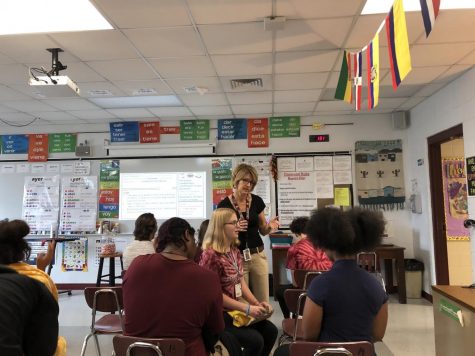Dr. Etter Introduces Flexible Seating Into Her Classroom
October 31, 2019
Desks have been considered a staple of the American classroom since before recent memory. A teacher here at West decided to challenge the norm to see the impact it would have on her students.
Spanish 3-4 teacher Dr. Fran Etter says that since she introduced flexible seating into her classroom this school year, she’s seen a positive change in her students’ behavior.
“More alertness and more participation in the class. More on-task behavior, students are sitting up straighter, they’re looking at me, they’re engaged a lot more,” Dr. Etter said.
Seating is currently assigned, but students will soon be allowed to choose their own seats. The system is also centered around discussion.
“People seem more participatory than the students in my other classes,” sophomore Alexis Dalluhn said.

The open seating allows for more classroom discussion not only with Dr. Etter, but between students as well.
Throughout each period, students may move around the room for activities.
“Everyone is up and active,” junior Justin Harris said.
In addition to encouraging more movement during class, Etter chose to remove desks for other purposes, such as improving posture.
“The seating arrangement has also been really good on everyone’s posture as well,” Dalluhn said.
Etter has previously implemented other unique methods into her class as well; since last year, backpacks have remained in the back of the room during class.
“I got rid of backpacks last year, as a part of something that they [students] would keep next to them by their chairs or their seats when they had desks,” Etter said.
Students weighed in on day-to-day life in the class, and how these changes affect them.
“It’s hard to write on stuff, you have to get up and get a board to write on,” Harris said.
Etter says removing the desks has eliminated another distraction from the room: “The opportunity for the students to decide to lay their head down on their desk, or hide behind their desk in such a way that they would want to use their phones.”
How the lack of desks translates to different classes and curriculums is up for discussion, too.
“If I were in my math or science class, I wouldn’t feel comfortable. But in other classes, that usually have discussions like English or Social Studies, it would make the class more open and feel free to speak about the topic,” Dalluhn said.
There are also plans to change the layout of the room in coordination with what is to be focused on each day; no matter what, Etter doesn’t plan to turn back now.
“At this point, I would never go back. I really like it,” Etter said.

